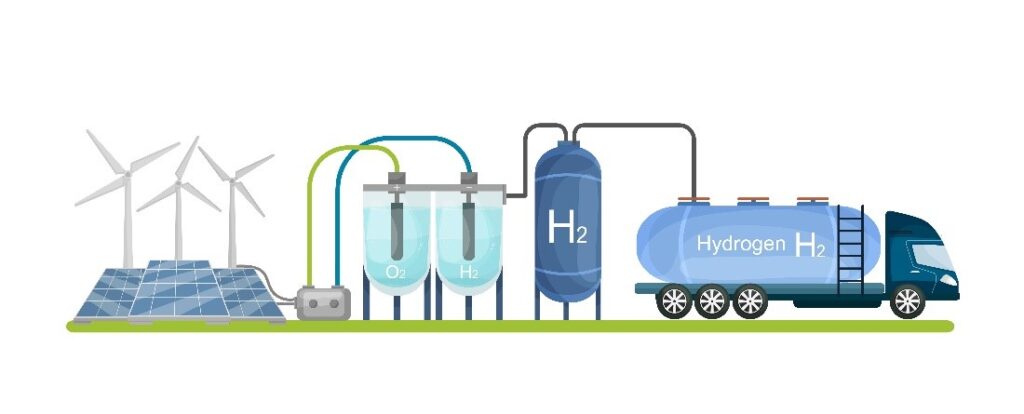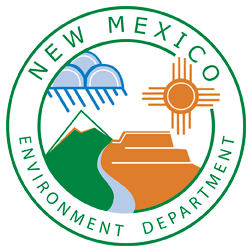What is hydrogen?
Hydrogen is the lightest and most abundant element in the universe. It occurs naturally on Earth, mostly in combination with other elements like in water (H2O) and natural gas (CH4). Hydrogen is a diatomic element, meaning it appears in pairs and is annotated as (H2). Hydrogen has been produced and used in the United States for decades in chemical refining, space exploration, and in fuel cells to produce electricity.
Like electricity, hydrogen is an energy carrier that must be produced from another substance. Hydrogen can be produced from a variety of sources including water, fossil fuels, or biomass. Hydrogen also has the highest energy content of any common fuel by weight (about three times more than gasoline).
How does New Mexico benefit from the production and use of hydrogen?
Simply stated, New Mexico will not achieve its ambitious climate goals without incorporating hydrogen into our climate strategy. The climate crisis is hitting New Mexico hard with increasing temperatures, relentless drought, and devastating wildfires. The changing climate is a direct result of greenhouse gases, like carbon dioxide (CO2) and methane (CH4), being introduced into the atmosphere by human activity. Leading scientists and organizations like the United Nations Environment Programme urge countries to reduce greenhouse gas emissions to net zero by 2050 to avoid the worst consequences of climate change. Hydrogen is a necessary energy carrier for transitioning to net zero carbon emissions and meeting this goal because it can be produced from water using renewables, another key element to New Mexico’s fight against climate change, and when used in a fuel cell, its only emission is water vapor.
The benefits of hydrogen are many. Hydrogen can store excess energy from wind and solar to be converted back into electricity or heat when there is demand, just like a battery. It can also power hard-to-abate sectors including cement processing, steel manufacturing, fertilizer production, and can replace fossil fuels in heavy transportation, power generation, and industrial uses using existing infrastructure.
Importantly, we can readily measure the carbon footprint of hydrogen, including emissions from all aspects of production to end-use. This measurability allows us to make sure hydrogen production and use is helping us reach our climate goals.
Thanks to this unique combination of features, hydrogen is a key technology for the low-carbon future, especially in New Mexico.

How is New Mexico supporting the development of a hydrogen economy?
In March 2022, Governor Michelle Lujan Grisham signed Executive Order 2022-013, which directs the Departments of Environment; Energy, Minerals, and Natural Resources; Economic Development; Tax and Revenue; and Indian Affairs to support the development of the clean hydrogen economy. It directs these departments to support the Western Interstate Hydrogen Hub Coalition (WISHH). It also encourages continued collaboration with national laboratories to deliver economic growth, jobs, and clean energy to New Mexico. The State of New Mexico is also working with academic institutions through the Northern Rio Grande Corridor Collaborative.
After New Mexico joined the WISHH though a Memorandum of Understanding (MOU), the WISHH submitted a concept paper in November 2022 to the the U.S. Department of Energy’s (DOE) Regional Clean Hydrogen Hubs program. In response, DOE issued an “Encouraged” recommendation for the concept paper and together we have been working on the next step. According to the DOE, reviewers only issued “Encouraged” recommendations to 33 of the 79 concept papers to submit full proposals.
WISHH formed a legal entity, WIH2, to develop and submit a full application to the DOE on how project partners can develop the market, terrain, and technology for hydrogen in New Mexico and the other regional states. WIH2 submitted the application in April 2023 and the DOE is expected to announce hydrogen hub awardees in Fall 2023.
The role of the State is to regulate the mining, manufacturing, and use of hydrogen in New Mexico. The role of the project partners is to innovate how hydrogen can be safely and economically produced in New Mexico. Other partners in WISHH include the universities and colleges in New Mexico, which are both part of the research applications and workforce development opportunities provided by the Hydrogen Hub.
The multi-sectoral approach by the New Mexico State Government uses hydrogen as a catalyst to spur growth and innovation in not just energy, but transportation, agriculture, industry and education.
Is hydrogen safe?
Handled properly, hydrogen is just as safe, if not safer, than other common fuels because:
- Hydrogen is not toxic. Gasoline and diesel are. A hydrogen leak or spill wouldn’t contaminate the environment or threaten the health of humans or wildlife, unlike fossil fuels.
- When used in a fuel cell, hydrogen produces only water and electricity, while combustion of conventional fuels produces harmful air pollution.
- Compared to gasoline and diesel, hydrogen is less likely to combust in open air due to its tendency to rise quickly and disperse. Gasoline in gaseous form is heavier than air and will stay close to the ground.
- While combustion of hydrogen can produce nitrogen oxides emissions, NMED is equipped and prepared to regulate these emissions as it already does from other sources. The State of New Mexico continues to have the responsibility and regulatory framework in place to appropriately regulate the safety of and emissions from any hydrogen facilities.
The ability to handle hydrogen safely is also demonstrated by over 50 years of use in space exploration, chemical refining, and fertilizer production. Scientists and engineers in standards development organizations and government agencies work together to develop and enforce stringent standards for hydrogen systems and fuel cells both for current technology and as new technologies emerge. Years of research and experience have resulted in robust engineering controls and guidelines for the safe use of hydrogen by the general public.
Updated 4/2024

